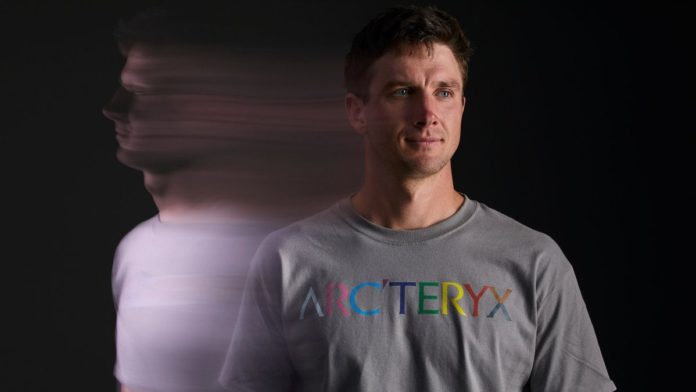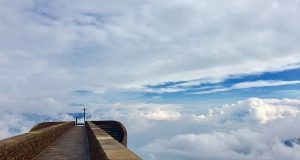
Jordan Cannon is a professional climber. Last November, he free climbed Golden Gate on El Capitan in 20 hours and 26 minutes, just a few days after Emily Harrington’s historic one-day ascent of the route. He decided he wanted to come out publicly, and he reached out to us to help him do it.
Here’s Jordan’s story, as told to Maren Larsen.
Every year, I give myself a birthday challenge—some kind of arbitrary climbing goal—to celebrate and push myself. Each year I try to up the ante a little bit, and for this, my 27th birthday, the best challenge I could think of for myself was to come out publicly. So here it is: I’m gay.
Recently, my sexuality has felt like a distraction from what I want all my focus to be on: climbing. I’ve been climbing for eight years, and for most of that time, my sexual orientation and identity didn’t affect me at all—partially because I never really gave those parts of me much room to breathe. But over the past two years, I’ve begun telling close friends. And recently I realized that I’ve been carrying this weight on my shoulders a little too long.
I moved around a lot when I was a kid, mostly in the southeast. My family and the people around me were very religious and conservative—like, reading-Harry Potter-is-a-sin religious. People made gay jokes all the time, used faggot as an insult. It was a really fearful place for me, because from the time I was four, I knew I was different. When I was inadvertently outed to my parents late in high school, they reacted in the extreme. My dad sat me down and told me that I was giving into the lies of the devil and needed to return to God. They have apologized now, and we’re on good terms. But that experience definitely inhibited my progress toward accepting who I am.
My upbringing made it really hard for me to form long-lasting relationships. But when I moved to California after high school, I started living on my own and found the climbing community. I had this realization that this is my place, these are my people, and this is the thing I want to do for the rest of my life. And given all that, these friends that I have now are probably going to be my friends forever, and I should start treating them as such and opening up to them.
Around the same time, I felt that I had been too selfish in my climbing. I had prioritized my own goals over the people that got me there. I wanted to refocus on partnerships because, at the end of the day, that’s the thing that makes this sport so meaningful to me.
That’s when I met Mark Hudon, my climbing partner and personal hero. Mark is like a father figure, and it may seem strange to say, but my friendship with him was really the first serious relationship I’d ever had. He showed me true love and acceptance in a way that I never had before.
That safety allowed me to pay attention to my sexuality and try to unpack it for the first time. It felt daunting and scary. That process started to take a lot of my energy and focus away from my climbing. In some ways, that was a good thing: I had been hiding this part of me from everyone, including myself, for my whole life. But as I started to open up with all of my friends, yet still try to hide this part of myself publicly, I started to feel like I was being inauthentic. Seeing what’s going on in the outdoor industry and in the climbing community with people demanding more diversity and representation, I began to ask myself if I wanted to participate in that conversation.
The first person I came out to was Samuel Crossley, who directed Free As Can Be, a documentary about my partnership with Mark. Sam is an out gay filmmaker and photographer and very visible in the climbing world. He was so excited for me. He was like, Oh my gosh, we have to put this in the film. And I was like, No way, dude. I wasn’t ready yet. But from the very beginning, he was very encouraging about me sharing my story publicly.
And then earlier this year, I signed with Scarpa. They have an athlete mentorship initiative where their pro athletes mentor members of the community. I outed myself to my manager by asking that they send any gay applicants my way. I ended up being paired with Patrick Dunn, who runs Out in the Wild, a queer climbing community and guiding service in Bend, Oregon. On the application, they asked him which professional athletes he looked up to and identified with. None, he said. I don’t relate to any of them.
And I thought, man, that’s such a bummer. For me, sexuality didn’t play a part in who I thought of as a role model. But people in the climbing community have been speaking up lately about representation—asking ourselves, for instance, how we can expect a Black person to feel welcome if they don’t see any Black climbers. That made me start to think about my impact, because as far as I know there aren’t any out gay men who are professional climbers.
When I came out to Patrick, it seemed to have a big impact on him. It made me understand the value that action could have for the community as a whole. If me displaying a little bit of courage and coming out and being visible helps climbers like Patrick or those in the new generation see themselves in the sport, it’s worth it.
Climbing can be a pretty macho sport. But I have had zero experiences with homophobia as I’ve come out to other climbers, even those from the older generation. I think that’s partially because climbing has always been a place for outsiders and misfits and people who want to live an alternative lifestyle. But oftentimes it’s just that people don’t really give a shit. At the end of the day, most of us just care about climbing, first and foremost. If you’re a good climber and a good human being, people are going to respect you for that, regardless of your sexual identity.
One of my biggest fears when I started to consider coming out was that people were going to assume that my primary career from now on would be as a gay activist, and that this would be seen as the majority of my identity. I want to show up for the LGBTQ+ community. But I’m also doing this to free myself so that I can focus all my energy where I want it to be, on my climbing. Maybe one day I’ll be more comfortable playing an activist role, but for now the best I can do is focus on climbing and try to set an example for others to be themselves.
To be honest, I just want to move on with my life. To do so, it’s unfortunately still necessary to come out. I hope that one day, we will be past the point where people generally assume everybody around them is straight, and I hope that me coming out is a step in that direction. Because for me, the climbing community was not a barrier to coming out. That community is what made it possible. This is the takeaway I want not just those with a similar struggle, but anyone reading this to have: the outdoors and the outdoor community can be a great catalyst for recovery from trauma. Moving out west and becoming part of the climbing community gave me the tools and the confidence I need to be able to accept myself and come out publicly.
Next week, I’m headed to Yosemite Valley. Spring in Yosemite is the most important part of the climbing season for me. I don’t want to get into specifics, but I have big plans. Now I’m out of the closet, and my business is taken care of. I can focus all my energy on what matters most to me right now: climbing big walls.







